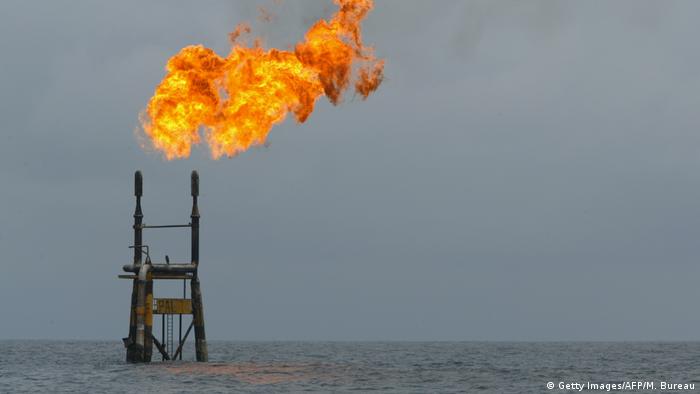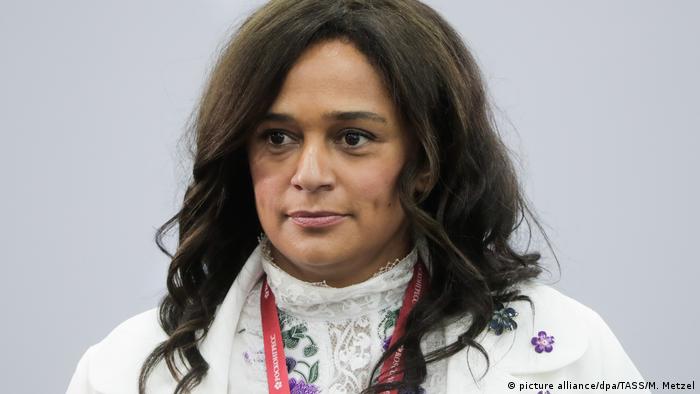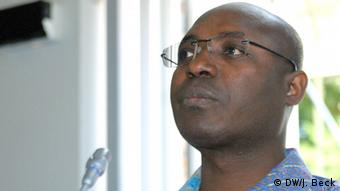January 20, 2020 By Agence France-Presse

Angolan prosecutors vowed on Monday to use “all possible” means to bring back Isabel dos Santos, the former president’s billionaire daughter, after thousands of leaked documents revealed new allegations she siphoned off hundreds of millions in public money.
Dubbed Africa’s richest woman, dos Santos is accused of using her father’s backing to plunder state funds from the oil-rich but impoverished southern African country and — with the help of Western consulting firms — move the money offshore.
She stopped living in Angola after her authoritarian father Jose Eduardo dos Santos, who ruled the country for nearly 40 years, stepped down in 2017 for his anointed successor Joao Lourenco.
She now spends her time between London and Dubai.
“We will use all possible means and activate international mechanisms to bring Isabel dos Santos back to the country,” prosecutor general Helder Pitra Gros told public radio.
“We have asked for international support from Portugal, Dubai and other countries,” he added.
The 46-year-old dos Santos is already being investigated as part of an anti-graft campaign launched by Lourenco, who has vowed to root out corruption.
Prosecutors last month froze bank accounts and holdings owned by the businesswoman and her Congolese-Danish husband Sindika Dokolo, a move dos Santos described as motivated by a groundless political vendetta.
Gros’ remarks came after a trove of 715,000 files dubbed the “Luanda Leaks” on Sunday revealed how the eldest daughter of the former president allegedly moved the vast sums into overseas assets.
The award-winning New York-based International Consortium of Investigative Journalists (ICIJ) behind the release alleged the international system has allowed powerful individuals like her to move assets around the world, without questions.

PUBLICO/AFP/File / FERNANDO VELUDO Prosecutors
have already frozen the bank accounts and holdings
owned by dos Santos and her Congolese husband Sindika Dokolo
“Based on a trove of more than 715,000 files, our investigation highlights a broken international regulatory system that allows professional services firms to serve the powerful with almost no questions asked,” the ICIJ wrote.
The group said its team of 120 reporters in 20 countries was able to trace “how an army of Western financial firms, lawyers, accountants, government officials and management companies helped (dos Santos and Dokolo) hide assets from tax authorities”.
– ‘Highly coordinated attack’ –
Dos Santos took to Twitter to refute the claims, launching a salvo of around 30 tweets in Portuguese and English, accusing journalists involved in the investigation of telling “lies”.
“My fortune is built on my character, my intelligence, education, capacity for work, perseverance,” she wrote.
Born in Baku, Azerbaijan, and educated in Britain, dos Santos — scornfully nicknamed “the princess” — was named Africa’s first female billionaire in 2013 by Forbes, which estimates her current wealth at $2.1 billion.
Her lawyer dismissed the ICIJ findings as a “highly coordinated attack” orchestrated by Angola’s current rulers, in a statement quoted by The Guardian newspaper.
Dos Santos herself told BBC Africa the file dump was part of a “witch hunt” meant to discredit her and her father.

“Based on a trove of more than 715,000 files, our investigation highlights a broken international regulatory system that allows professional services firms to serve the powerful with almost no questions asked,” the ICIJ wrote.
The group said its team of 120 reporters in 20 countries was able to trace “how an army of Western financial firms, lawyers, accountants, government officials and management companies helped (dos Santos and Dokolo) hide assets from tax authorities”.
– ‘Highly coordinated attack’ –
Dos Santos took to Twitter to refute the claims, launching a salvo of around 30 tweets in Portuguese and English, accusing journalists involved in the investigation of telling “lies”.
“My fortune is built on my character, my intelligence, education, capacity for work, perseverance,” she wrote.
Born in Baku, Azerbaijan, and educated in Britain, dos Santos — scornfully nicknamed “the princess” — was named Africa’s first female billionaire in 2013 by Forbes, which estimates her current wealth at $2.1 billion.
Her lawyer dismissed the ICIJ findings as a “highly coordinated attack” orchestrated by Angola’s current rulers, in a statement quoted by The Guardian newspaper.
Dos Santos herself told BBC Africa the file dump was part of a “witch hunt” meant to discredit her and her father.

AFP/File / Adalberto ROQUE Former Angolan president
Jose Eduardo Dos Santos ruled for nearly 40 years before stepping down in 2017
She headed Angola’s national oil company Sonangol until her father’s successor forced her out after becoming president in 2017.
“Red flags really went up when she was appointed head of the state oil company at a time when her father still had significant influence,” said Daniel Bruce, who heads the UK branch of anti-corruption campaign group Transparency International.
“You could see there were major conflicts of interest starting to emerge,” he added.
Dos Santos said on Wednesday that she would consider running for president in the next election in 2022.
– Western consultants –
The ICIJ investigation said Western consulting firms such as PwC and Boston Consulting Group were “apparently ignoring red flags” while helping her stash away public assets.
“Regulators around the globe have virtually ignored the key role Western professionals play in maintaining an offshore industry that drives money laundering and drains trillions from public coffers,” the report said.
Its document trove included redacted letters allegedly showing how consultants sought out ways to open non-transparent bank accounts.
London-based firm PwC*** was among those advising her businesses.
The consultancy said it had “immediately initiated an investigation” in the wake of the “very serious and concerning allegations.”
“We have also taken action to terminate any ongoing work for entities controlled by members of the dos Santos family,” it added in a statement.
The Boston Consulting Group did not immediately respond to an attempt to get comment by AFP.
One confidential document allegedly drafted by Boston Consulting in September 2015 outlined a complex scheme for the oil company to move its money offshore.
The investigation also published a similar 99-page presentation from KPMG.
“UK firms… have played a role both in helping her to amass this fortune but also to invest the proceeds of these suspicious deals,” said Bruce.
“There are questions to answer,” he added. “Particularly for those who helped her acquire property.”
Dos Santos and Dokolo have invested in several luxurious London houses and amassed an impressive collection of valuable artwork.
Her husband, a well-known collector of African arts, developed that passion from his billionaire banker father Augustin Dokolo Sanu.
*** PwC IS PRICE WATERHOUSE COOPER ACCOUNTING
She headed Angola’s national oil company Sonangol until her father’s successor forced her out after becoming president in 2017.
“Red flags really went up when she was appointed head of the state oil company at a time when her father still had significant influence,” said Daniel Bruce, who heads the UK branch of anti-corruption campaign group Transparency International.
“You could see there were major conflicts of interest starting to emerge,” he added.
Dos Santos said on Wednesday that she would consider running for president in the next election in 2022.
– Western consultants –
The ICIJ investigation said Western consulting firms such as PwC and Boston Consulting Group were “apparently ignoring red flags” while helping her stash away public assets.
“Regulators around the globe have virtually ignored the key role Western professionals play in maintaining an offshore industry that drives money laundering and drains trillions from public coffers,” the report said.
Its document trove included redacted letters allegedly showing how consultants sought out ways to open non-transparent bank accounts.
London-based firm PwC*** was among those advising her businesses.
The consultancy said it had “immediately initiated an investigation” in the wake of the “very serious and concerning allegations.”
“We have also taken action to terminate any ongoing work for entities controlled by members of the dos Santos family,” it added in a statement.
The Boston Consulting Group did not immediately respond to an attempt to get comment by AFP.
One confidential document allegedly drafted by Boston Consulting in September 2015 outlined a complex scheme for the oil company to move its money offshore.
The investigation also published a similar 99-page presentation from KPMG.
“UK firms… have played a role both in helping her to amass this fortune but also to invest the proceeds of these suspicious deals,” said Bruce.
“There are questions to answer,” he added. “Particularly for those who helped her acquire property.”
Dos Santos and Dokolo have invested in several luxurious London houses and amassed an impressive collection of valuable artwork.
Her husband, a well-known collector of African arts, developed that passion from his billionaire banker father Augustin Dokolo Sanu.
*** PwC IS PRICE WATERHOUSE COOPER ACCOUNTING
Documents reveal how 'Africa's richest woman' stole fortune from her country
Issued on: 20/01/2020

Isabel Dos Santos, daughter of Angola’s former President and Africa's richest woman, sits for a portrait during a Reuters interview in London, Britain, January 9, 2020. Picture taken on January 9. © REUTERS/Toby Melville/File Photo
Text by:NEWS WIRES|
Video by:Camille NEDELEC
An award-winning investigative team published a trove of files Sunday allegedly showing how Africa's richest woman syphoned hundreds of millions of dollars of public money into offshore accounts.
The New York-based International Consortium of Investigative Journalists (ICIJ) worked with newspapers such as Munich's Suddeutsche Zeitung to reveal the "Panama Papers" tax haven scandal in 2016.
Its latest series called "Luanda Leaks" zeros in on Isabel dos Santos, the daughter of former Angola president Jose Eduardo dos Santos.
Angola's prosecutors last month froze the bank accounts and assets owned by the 46-year-old businesswoman and her Congolese husband Sindika Dokolo, which she described as a groundless political vendetta.
"Based on a trove of more than 715,000 files, our investigation highlights a broken international regulatory system that allows professional services firms to serve the powerful with almost no questions asked," the ICIJ wrote.
The group said its team of 120 reporters in 20 countries was able to trace "how an army of Western financial firms, lawyers, accountants, government officials and management companies helped (dos Santos and Dokolo) hide assets from tax authorities".
Dos Santos took to Twitter to refute the claims, launching a salvo of around 30 tweets in Portuguese and English, and accusing journalists involved in the investigation of telling "lies".
"My fortune is built on my character, my intelligence, education, capacity for work, perseverance," she wrote.
She also blasted "the racism and prejudice" of SIC-Expresso, a Portuguese TV station and newspaper, and member of the ICIJ, "that recall the colonial era when an African could never be considered equal to a European".
Dos Santos's lawyer dismissed the ICIJ findings as a "highly coordinated attack" orchestrated by Angola's current rulers, in a statement quoted by The Guardian newspaper.
Dos Santos herself told BBC Africa the file dump was part of a "witch hunt" meant to discredit her and her father.
The former president's daughter headed Angola's national oil company Sonangol. Forbes magazine last year estimated her net worth at $2.2 billion.
Her father's successor Joao Lourenco forced her out of the oil company after becoming president in 2017.
Dos Santos said on Wednesday that she would consider running for president in the next election in 2022.
Western consultants
The ICIJ investigation said Western consulting firms such as PwC and Boston Consulting Group were "apparently ignoring red flags" while helping her stash away public assets.
"Regulators around the globe have virtually ignored the key role Western professionals play in maintaining an offshore industry that drives money laundering and drains trillions from public coffers," the report said.
Its document trove included redacted letters allegedly showing how consultants sought out ways to open non-transparent bank accounts.
One confidential document allegedly drafted by Boston Consulting in September 2015 outlined a complex scheme for the oil company to move its money offshore.
The investigation also published a similar 99-page presentation from KPMG.
None of the companies named issued immediate statements in response to the investigation.
(AFP)

Luanda Leaks point to international complicity as Isabel dos Santos faces scrunity
Angolans are calling for an international investigation into the world-wide dealings that allowed Isabel dos Santos, the daughter of the former president, to become the richest woman in Africa.
No Angolan ever believed that the fortune amassed by Isabel dos Santos, daughter of former President Jose Eduardo dos Santos, was acquired by legal means. But even the most skeptical might have been surprised by the extent of international connivance in the plundering of the country's resources as exposed by the recent leak of documents concerning "Africa's richest woman."
The New York-based International Consortium of Investigative Journalists (ICIJ) on Sunday published a trove of files allegedly showing how dos Santos syphoned hundreds of millions of dollars of public money into offshore accounts. The more than 715,000 files — dubebd "Luanda Leaks" — were investigated by 120 reporters in 20 countries, including Germany.
Germany's involvement
German public broadcasters NDR and WDR, together with the daily Süddeutsche Zeitung, found that the beverage company Sodiba, owned by dos Santos and her husband, Sindika Dokolo, received a loan of €50 million ($55 million) from a subsidiary of the German development bank KfW without a prior comprehensive examination of the business. The loan was used by dos Santos to purchase a beer brewing plant and two bottling lines from German company Krones AG in 2015. Dos Santos' father allegedly used his influence to get the investment project approved.
Human rights activist and researcher Rafael Marques de Morais believes the current drive against corruption in Angola is legitimate
Human rights activist and researcher Rafael Marques de Morais says that it is "only fair" that countries like Germany now help investigate how international actors enabled the former president's 46-year-old daughter to acquire a vast fortune estimated at over $3 billion. "[German chancellor] Angela Merkel is visiting Angola [in February] and that issue must be raised: How come funds provided by the German government were also used to add to her [dos Santos'] wealth?"
"This is a major case of international corruption," de Morais told DW, adding: "It was the world that projected Isabel dos Santos as the richest and most successful businesswoman when she was a thief." According to the ICIJ, the leaked documents show how "Western financial firms, lawyers, accountants, government officials and management companies helped hide assets from tax authorities."
The stolen billion
According to the leaked files, in recent years dos Santos and her husband founded more than 400 companies in 41 jurisdictions, among them tax havens like Malta, Mauritius and Hong Kong. These companies continuously benefited from public contracts, consulting services and loans in Angola.

President Joao Lourenco was received in Berlin by his German counterpart Frank-Walter Steinmeier in 2018
In late December, Angolan authorities froze dos Santos' assets in the African country following allegations by prosecutors that she and her husband had embezzled more than $1 billion from state companies Sonangol and Sodiam. Isabel dos Santos was put in charge of Sonangol by her father in 2016. She was later fired from this position by her father's successor, Joao Lourenco.
Isabel dos Santos contonues to deny any wrongdoing. "My fortune is built on my character, my intelligence, education, capacity for work, perseverance," dos Santos wrote on social media platforms. She insists that both the current investigation in Angola and "Luanda Leaks" are politically motivated and coordinated attacks against her.
'Corruption is killing the country'
Some analysts have voiced suspicions that current president is not so much motivated by the fight against corruption than by a need to consolidate his power after succeeding long-time ruler Jose Eduardo dos Santos. Robert Besseling, the executive director of EXX Africa — a company that assesses business risks — told DW that he believed economic interests were at stake too: "[The government] seem to be pressuring associates, family and business to give up the assets of key companies in Angola and elsewhere at the very moment when there is a privatization agenda, where the government is seeking to sell a large share of the economy," he said.
Rafael Marques de Morais disagrees. Severely persecuted for his anti-corruption activism during the dos Santos era, he believes that Lourenco is truly bent on cleaning up the country. However, this is also in his own best interest: Angolans are increasingly upset about the deep economic crisis in the oil-rich country, which was also precipitated by the plundering of its resources by a corrupt elite. The discontent does not bode well for President Lourenco's party, the MPLA, which has ruled the country since independence 45 years ago. "Dos Santos was in power for 38 years and he privatized the state mostly in favor of his children. That's why there is an investigation into corruption. And corruption must end in Angola, because it is killing the country," de Morais said.

Angola's huge wealth in natural resources has failed to trickle down to the population
The need to reform the judicial system
There are many investigations now taking place against current and former government officials. A number of generals and members of parliament have been indicted and some jailed. "There is an effort by the government to really bring on as many cases as the judicial system can handle." A major problem, however, is the lack of reform of Angola's judicial system. "All the judges and prosecutors currently in office have been appointed by dos Santos himself," de Morais explains.
The immunity granted to former President dos Santos, who now resides in Spain for what are said to be medical reasons, expires in 2022. "After that, it is expected that he will have to respond in court for his misdeeds," according to de Morais. Despite the controversy, last week, Isabel dos Santos said she would consider running for president of Angola in the 2022 election.





No comments:
Post a Comment